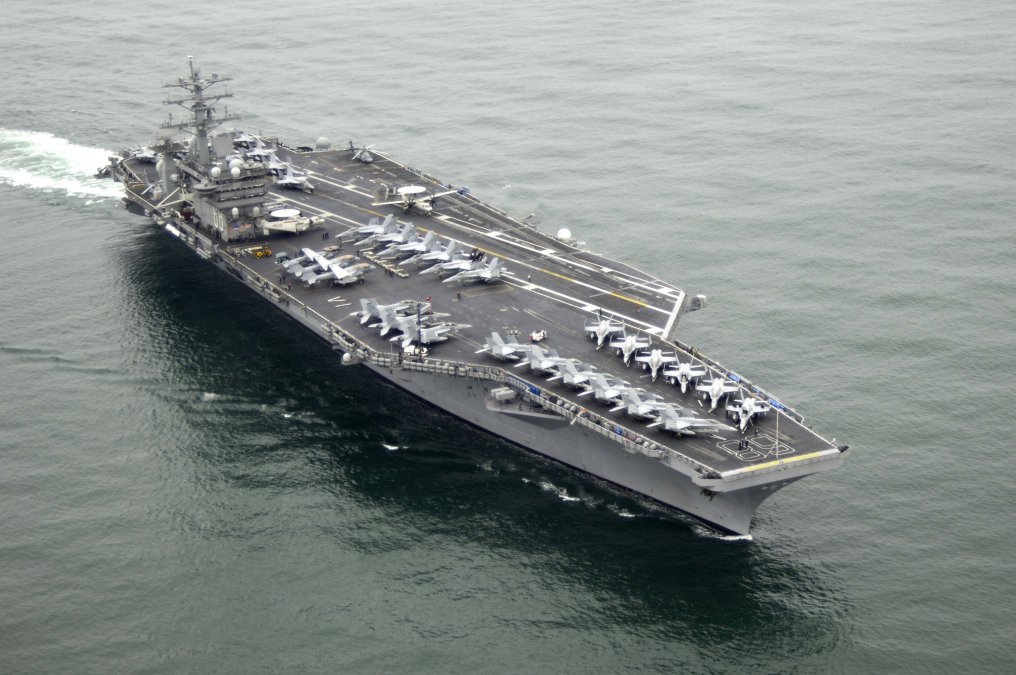U.S. Warning with Military Ships
U.S. Warning with Military Ships
The Persian Gulf region is currently witnessing one of its most sensitive and tense periods in recent years.
The deployment of the USS Carl Vinson aircraft carrier along with its strike group to the warm waters of the Persian Gulf has sounded alarm bells in regional security circles.
This extensive military movement is taking place while intelligence sources report the secret transfer of B-52 bombers and refueling fleets to American bases in the Middle East.
On the other hand, Iran is both openly and covertly strengthening its defensive readiness in the region.
According to reports published in media close to the Islamic Revolutionary Guard Corps, about 250 fast military vessels, including fast attack boats known as Red Wasps, have been stationed in the Strait of Hormuz and Iranian coastal waters.
These vessels, equipped with cruise missiles, could pose a serious threat to the American fleet in the event of a conflict.
Threatening Rhetoric from Both Sides
In recent weeks, Iranian and American military officials have been responding to each other with harsh language.
General Salami, the commander of the Islamic Revolutionary Guard Corps, bluntly announced that any reckless move by the enemy would be met with a devastating response that would send them to the depths of hell.
Meanwhile, the Pentagon has also issued a statement accusing Iran of provoking tensions and describing its military presence in the region as a defensive response.
Psychological Warfare or Military Reality
Western media and some analysts consider these movements as part of a planned psychological warfare aimed at increasing pressure on Iran before the possible resumption of nuclear negotiations.
However, some security sources in the region believe these movements might be a prelude to a limited naval conflict, especially considering that the U.S. has been deprived of using the land bases of some of its Arab allies for attacking Iran in recent years.
Regional and International Reactions
Some Gulf countries like the UAE and Saudi Arabia, which have tense relations with Iran, have indirectly welcomed the increased U.S. military presence in the region.
In contrast, Russia and China have issued statements calling for restraint from both sides.
The United Nations has also expressed its concern about the potential escalation of conflict.
The recent military movements in the Persian Gulf should be analyzed within the framework of the U.S.’s broader strategy towards Iran.
It seems Washington is implementing a maximum pressure policy alongside military threats to compel Iran to return to the negotiating table. This approach, a combination of coercive diplomacy and military threat, was previously tested during the Trump era.
From Iran’s perspective, these movements are more of a show to create fear and gain leverage in future negotiations than a real threat.
Nevertheless, the Islamic Republic, relying on its deterrent defense doctrine, is systematically increasing the potential costs for the U.S. in the event of a conflict.
The extensive deployment of ballistic and cruise missiles on the southern coasts, the readiness of special naval units, and repeated warnings from military commanders are all part of this strategy.
Among the potential scenarios, one will include:
Continuation of the current situation with ongoing tensions without major conflict, with occasional limited naval skirmishes. Resumption of negotiations, leading to a gradual reduction in tensions if both sides agree on a new framework. Controlled conflict, with a limited naval battle that is quickly contained. In this context, the role of third-party actors like Russia, China, and the European Union is crucial in managing the crisis.
Any escalation of tensions in the Persian Gulf could have devastating effects on the global economy, a concern that has led the international community to closely monitor developments in the region.

